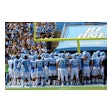A university's court victory against a coach it fired may lead to changes.
Under the doctrine of sovereign immunity, governmental entities such as federal, state or local municipalities and their officials have absolute immunity from legal liability in court. While the majority of sovereign immunity cases involve an allegation of negligence on the part of the governmental entity or its employees, there are other uses of the sovereign immunity defense.
A good example is Johnson v. Sorensen [2005 Ala. LEXIS 72], which arose from a contract dispute. In 1997, Ellis Johnson was hired by the University of Alabama as an assistant football coach as part of the hiring of Mike Dubose as head football coach. After Dubose was fired as head coach during the 2000 football season, Mal Moore, the athletic director, met with Johnson and all the other assistant coaches and told them that because their employment contracts were tied to Dubose, their contracts were also being terminated.
When Johnson was fired in 2000, he still had a number of years left on his contract, which contained a liquidated-damages clause. As a result of the university's decision not to honor the terms of his contract, Johnson filed suit, alleging that the university was in breach of his employment contract. Johnson claimed that because he was terminated without cause, he was entitled to liquidated damages.
The provision contained in Johnson's contract stated that:
If the University terminates this contract without cause prior to its expiration... , the University shall pay, and Johnson agrees to accept as liquidated damages, at the option of the University, either (1) the base salary payable... as it becomes payable for the remainder of the contract term then in effect (without reduction for any outside income); or (2) within thirty (30) days of termination the total amount of the base salary due... for the remainder of the term of the contract then in effect.
The university, however, argued that it was immune from any damages and moved to dismiss Johnson's complaint. The university noted that under the Alabama Constitution, the state and its agencies (including the state university) have absolute immunity from suit as a result of the protection granted by sovereign immunity. Therefore, the university argued that Johnson was barred from recovering any liquidated damages under the contract.
Johnson, however, claimed that University of Alabama officials, by failing to disclose the applicability of the doctrine of sovereign immunity and the impact that it would have on his employment contract during contract negotiations, had fraudulently suppressed the fact that the liquidated damages provision of his contract was not actually enforceable.
On appeal to the Alabama Supreme Court, the court ruled that it was the obligation of everyone dealing with the state to have knowledge of its immunity. In support of its decision, the court pointed to another clause in Johnson's employment contract stating that: "It is expressly agreed and understood between the parties that nothing contained herein shall be construed to constitute a waiver by the University of its right to claim such exemption, privileges, and immunities as may be provided by law." Such a clause, the court held, should have been enough to put Johnson on notice of the immunity.
As for Johnson's argument that university officials owed him a duty to disclose the applicability of the doctrine of sovereign immunity, the court found that the university officials who negotiated Johnson's contract had little, if any, understanding of the true impact of sovereign immunity on Johnson's employment contract. Johnson, the court ruled, failed to present any substantial evidence that university officials knowingly deceived him.
On the other hand, the court noted, Johnson was a college graduate who had coached previously at the University of Alabama and was aware of the impact of the doctrine of sovereign immunity. If he had any questions or concerns as to the applicability of sovereign immunity, the court stated, he should have asked his attorney, who practiced in the field of sports law and advised him with regard to his employment contracts.
While the doctrine of sovereign immunity has been either abolished or significantly weakened in most states, there remain enough states in which the immunity is valid that the decision of the Alabama Supreme Court in Johnson v. Sorensen should be of significant concern to coaches and their attorneys.
In particular, coaches and their attorneys are now on notice that universities and colleges, at least in those states like Alabama where sovereign immunity is a valid defense, are able to shield themselves from contractual damages, and that any monies or benefits the school may owe a coach once he or she is terminated do not need to be paid. What this means is that coaches (and their agents) will almost certainly need to adjust their negotiation strategies. For example, as a result of the Johnson decision, coaches may be more inclined to ask for larger guaranteed base salaries during the early years of a contract. In addition, signing bonuses and other up-front monies may now assume greater importance to coaches.
If coaches are not going to be able to collect damages if fired, they and their agents may be able to use the Johnson decision to reduce the amount of money they need to pay to buy out their contracts. Therefore, buyout payments could be lower than the current industry standard or, perhaps, contract-release notice provisions could be shortened.
































